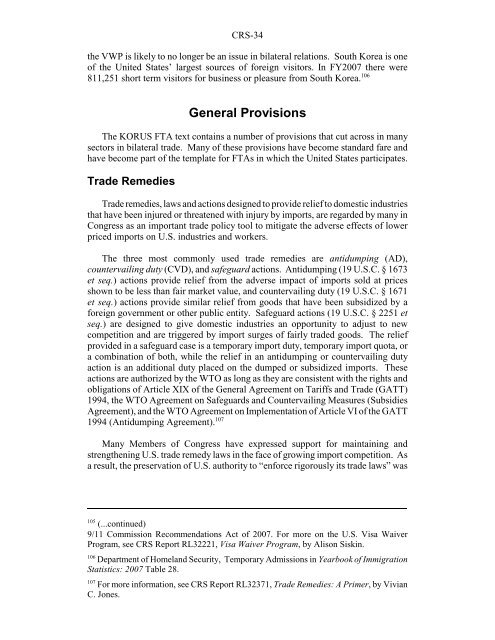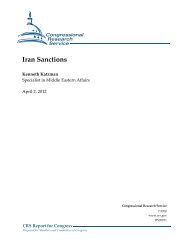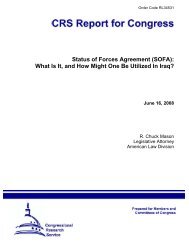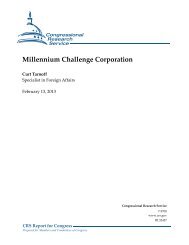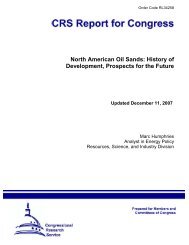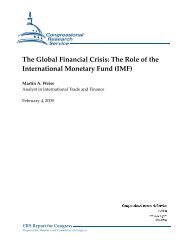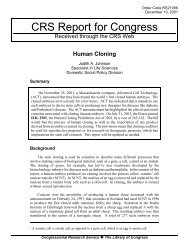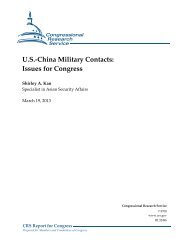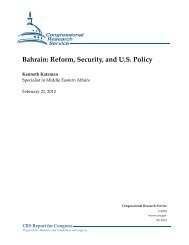The Proposed U.S.-South Korea Free Trade Agreement (KORUS ...
The Proposed U.S.-South Korea Free Trade Agreement (KORUS ...
The Proposed U.S.-South Korea Free Trade Agreement (KORUS ...
- TAGS
- korea
- fpc.state.gov
You also want an ePaper? Increase the reach of your titles
YUMPU automatically turns print PDFs into web optimized ePapers that Google loves.
CRS-34<br />
the VWP is likely to no longer be an issue in bilateral relations. <strong>South</strong> <strong>Korea</strong> is one<br />
of the United States’ largest sources of foreign visitors. In FY2007 there were<br />
811,251 short term visitors for business or pleasure from <strong>South</strong> <strong>Korea</strong>. 106<br />
General Provisions<br />
<strong>The</strong> <strong>KORUS</strong> FTA text contains a number of provisions that cut across in many<br />
sectors in bilateral trade. Many of these provisions have become standard fare and<br />
have become part of the template for FTAs in which the United States participates.<br />
<strong>Trade</strong> Remedies<br />
<strong>Trade</strong> remedies, laws and actions designed to provide relief to domestic industries<br />
that have been injured or threatened with injury by imports, are regarded by many in<br />
Congress as an important trade policy tool to mitigate the adverse effects of lower<br />
priced imports on U.S. industries and workers.<br />
<strong>The</strong> three most commonly used trade remedies are antidumping (AD),<br />
countervailing duty (CVD), and safeguard actions. Antidumping (19 U.S.C. § 1673<br />
et seq.) actions provide relief from the adverse impact of imports sold at prices<br />
shown to be less than fair market value, and countervailing duty (19 U.S.C. § 1671<br />
et seq.) actions provide similar relief from goods that have been subsidized by a<br />
foreign government or other public entity. Safeguard actions (19 U.S.C. § 2251 et<br />
seq.) are designed to give domestic industries an opportunity to adjust to new<br />
competition and are triggered by import surges of fairly traded goods. <strong>The</strong> relief<br />
provided in a safeguard case is a temporary import duty, temporary import quota, or<br />
a combination of both, while the relief in an antidumping or countervailing duty<br />
action is an additional duty placed on the dumped or subsidized imports. <strong>The</strong>se<br />
actions are authorized by the WTO as long as they are consistent with the rights and<br />
obligations of Article XIX of the General <strong>Agreement</strong> on Tariffs and <strong>Trade</strong> (GATT)<br />
1994, the WTO <strong>Agreement</strong> on Safeguards and Countervailing Measures (Subsidies<br />
<strong>Agreement</strong>), and the WTO <strong>Agreement</strong> on Implementation of Article VI of the GATT<br />
1994 (Antidumping <strong>Agreement</strong>). 107<br />
Many Members of Congress have expressed support for maintaining and<br />
strengthening U.S. trade remedy laws in the face of growing import competition. As<br />
a result, the preservation of U.S. authority to “enforce rigorously its trade laws” was<br />
105 (...continued)<br />
9/11 Commission Recommendations Act of 2007. For more on the U.S. Visa Waiver<br />
Program, see CRS Report RL32221, Visa Waiver Program, by Alison Siskin.<br />
106 Department of Homeland Security, Temporary Admissions in Yearbook of Immigration<br />
Statistics: 2007 Table 28.<br />
107 For more information, see CRS Report RL32371, <strong>Trade</strong> Remedies: A Primer, by Vivian<br />
C. Jones.


